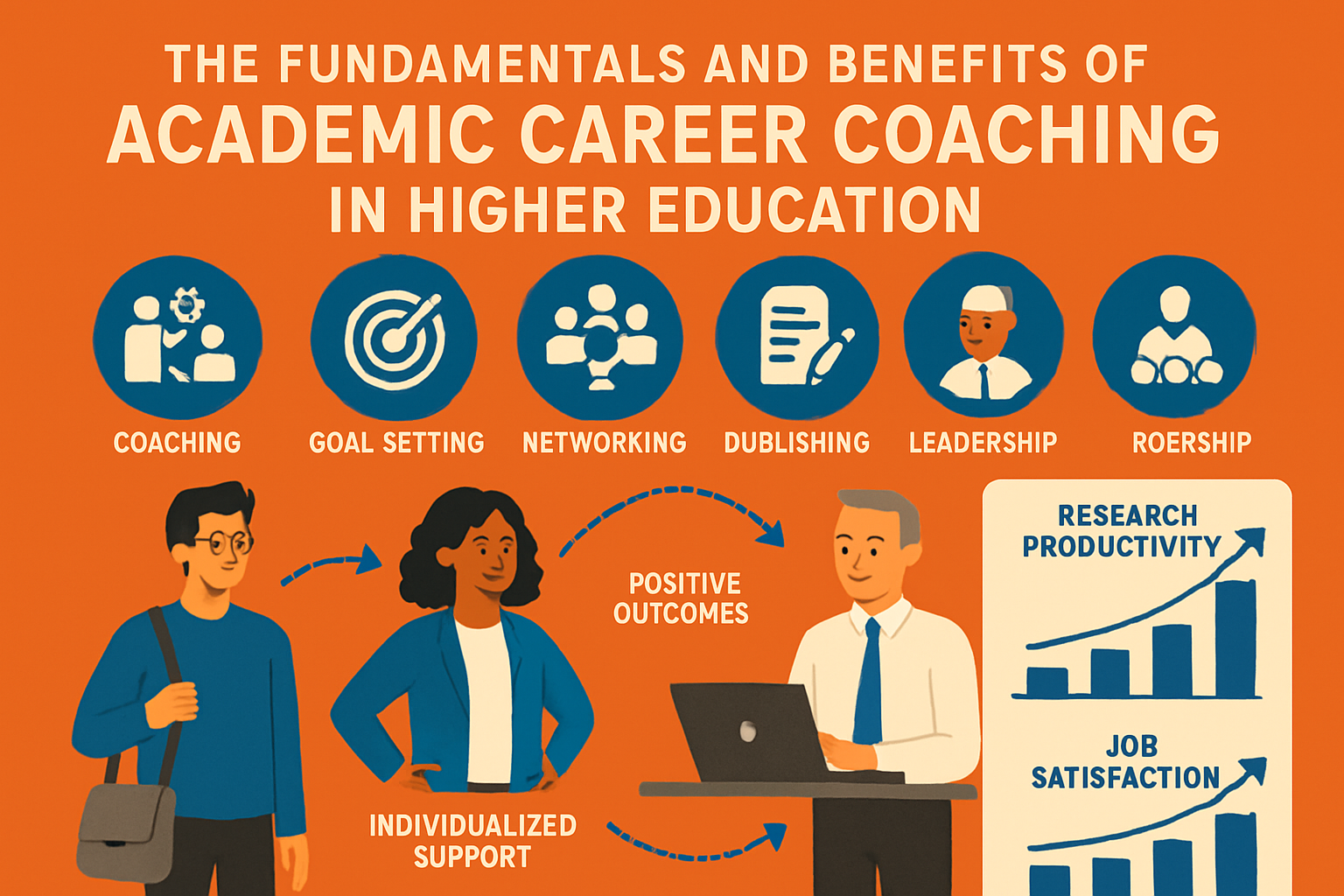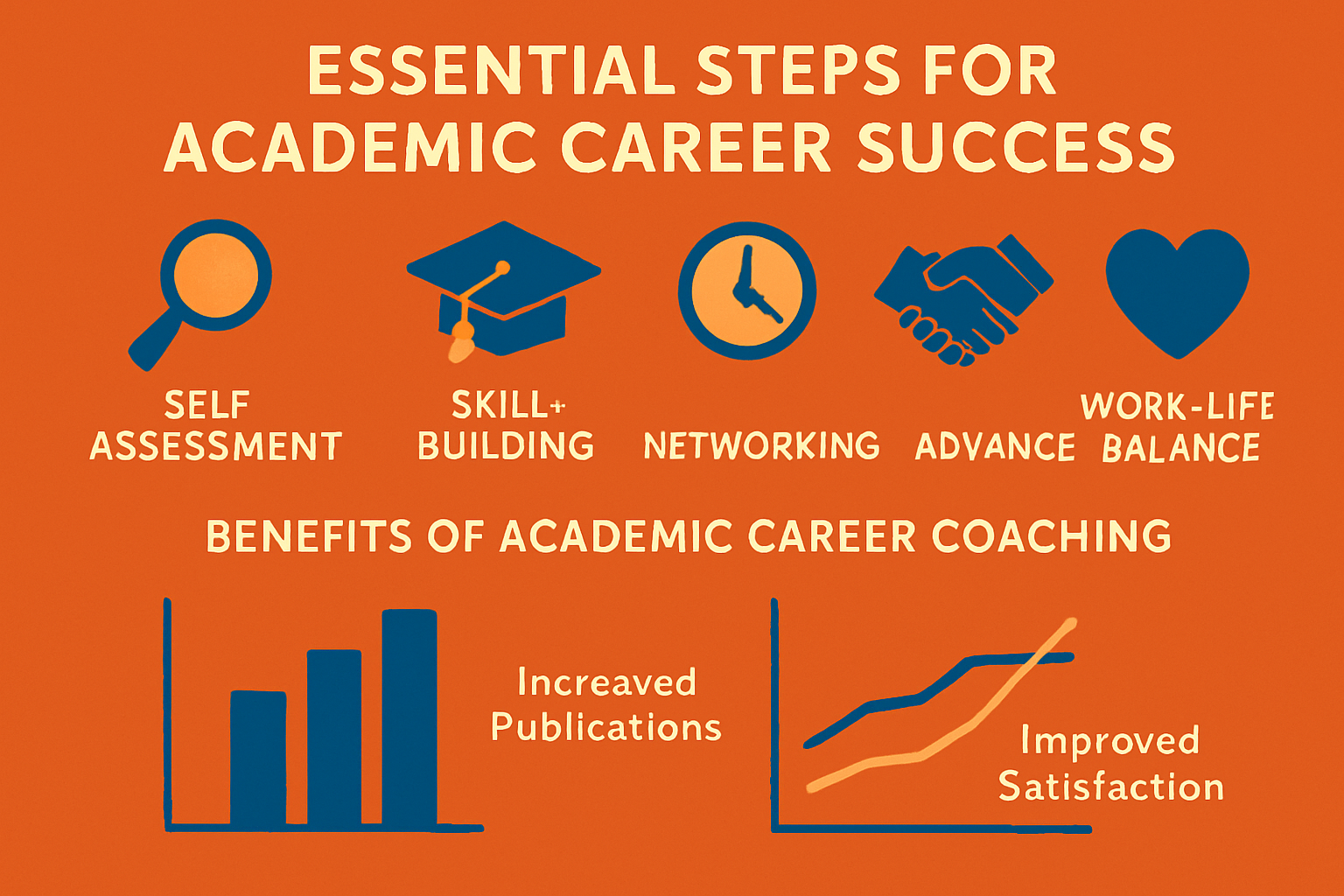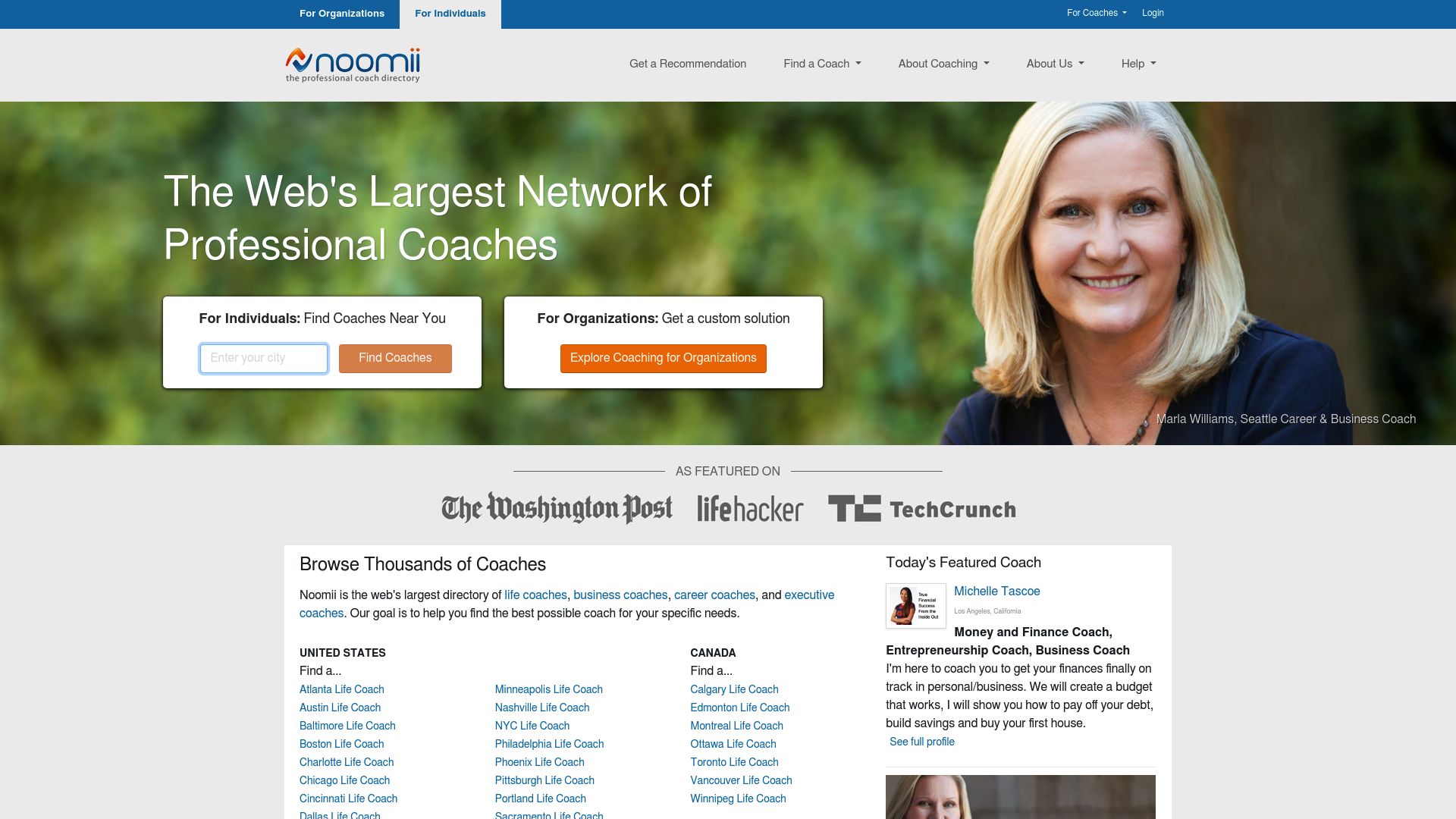Posted on August 21, 2025 by Don Markland
In the rapidly evolving landscape of academia, navigating a successful career path requires more than just expertise in your field. Today’s faculty, researchers, and higher education leaders face growing competition, shifting expectations, and complex institutional demands. This guide explores how academic career coaching can help you thrive in 2025 and beyond. Whether you’re seeking professional growth, better work-life balance, or the tools to lead with confidence, structured coaching provides a proven roadmap. Ready to unlock your full potential? Discover actionable strategies, modern solutions, and the support you need for academic success in the year ahead.Understanding Academic Career Coaching: Foundations and Benefits
Academic career coaching is transforming how faculty, researchers, and higher education leaders approach their professional journeys. As academic roles become more complex, coaching provides tailored support that goes beyond traditional mentoring. This section explores what academic career coaching truly means, who benefits, and the tangible outcomes you can expect.
What is Academic Career Coaching?
Academic career coaching is a personalized, structured process designed to help faculty and scholars achieve their professional and leadership goals. Unlike general mentoring or standard professional development, academic career coaching offers focused, one-on-one or group support to address specific challenges unique to academia. This coaching helps individuals set clear goals, manage their time, and build research and teaching skills. Coaches often have backgrounds as faculty or administrators, along with specialized training in coaching. For example, an academic coach may guide a new professor through balancing teaching loads while pursuing research grants, providing strategies tailored to their unique context.Core Benefits of Academic Career Coaching
The benefits of academic career coaching are both immediate and long-lasting. Participants often experience greater motivation and clearer direction in their careers. Coaching enhances teaching methods, research productivity, and leadership skills, helping faculty navigate institutional changes and bureaucracy. Key benefits include:- Personalized action plans for professional growth
- Improved instructional and scholarly strategies
- Support with transitions and adapting to change
- More effective communication and leadership approaches
Who Can Benefit?
Academic career coaching serves a wide range of professionals. Early-career faculty, mid-career academics, and institutional leaders all find value in coaching. Administrators looking to deepen leadership skills or academics facing burnout and career transitions are ideal candidates. Those considering job changes within higher education or seeking work-life balance can also benefit. For example, a faculty member contemplating a move to a new institution may use academic career coaching to clarify their direction and develop a strategic plan for a smooth transition.Key Outcomes and Success Metrics
Measuring the impact of academic career coaching reveals clear, data-driven outcomes. Participants often report higher publication rates, increased research productivity, and stronger professional networks. Coaching supports more promotions, tenure achievements, and leadership appointments. Success metrics include:- More publications and research outputs
- Expanded collaborations and networks
- Higher job satisfaction and improved work-life integration
- Enhanced decision-making and self-awareness
Essential Steps for Academic Career Success in 2025
Embarking on a successful academic journey in 2025 requires a proactive, strategic approach. Academic career coaching empowers faculty, researchers, and leaders to navigate each stage of professional growth with clarity and confidence. The following steps outline how to build a thriving academic career.
Step 1: Self-Assessment and Goal Setting
The foundation of academic career coaching is honest self-assessment. Reflecting on your unique strengths and areas for growth helps clarify your career aspirations. Tools like skills inventories or 360-degree feedback can illuminate hidden talents, such as grant writing or leadership potential. Set SMART goals—specific, measurable, achievable, relevant, and time-bound—to guide both your short-term and long-term academic progress. Academic career coaching supports you in identifying what truly matters, aligning your ambitions with actionable plans. For those seeking tailored guidance, platforms like Find Academic Career Coaches Online connect educators with coaches who specialize in academic development.Step 2: Building Professional Skills and Competencies
Academic career coaching highlights the importance of developing core competencies in research, teaching, and leadership. Assess which skills are most valuable for your next career milestone. This might include learning new research methodologies, mastering digital teaching tools, or honing communication abilities. Explore diverse options for upskilling, such as workshops, online courses, or peer mentoring. Academic career coaching can help you choose between one-on-one sessions, group coaching, or attending targeted conferences, ensuring your growth aligns with your unique learning style and career needs.Step 3: Time Management and Productivity Strategies
Effectively balancing research, teaching, and administrative responsibilities is a hallmark of academic career coaching. Coaches introduce proven techniques for prioritizing tasks and maintaining efficient workflows, such as time-blocking or using project management platforms. Academic career coaching also addresses procrastination, offering strategies to overcome barriers and maintain momentum. For example, many faculty maximize writing output during busy semesters by setting aside dedicated time slots and leveraging accountability from coaching sessions.Step 4: Networking and Collaboration
Building robust professional networks is central to academic career coaching. Coaches encourage you to connect not just within your institution, but also across disciplines and global academic communities. Strategies include joining professional associations, attending conferences, and seeking co-authorship opportunities. Group coaching often serves as a dynamic platform for networking, enabling academics to exchange ideas, share resources, and learn from each other’s experiences—all essential for long-term career advancement.Step 5: Navigating Career Transitions and Advancement
Academic career coaching is invaluable when preparing for promotions, tenure, or new leadership roles. Coaches clarify both formal and informal advancement requirements, helping you map out a strategic path. They also offer guidance on navigating departmental politics, negotiating for resources, and making informed decisions during job searches or career changes. Academic career coaching provides support for those considering transitions within higher education or even exploring opportunities beyond academia.Step 6: Achieving Work-Life Balance and Well-being
Sustaining a fulfilling academic career means prioritizing well-being. Academic career coaching recognizes the risks of burnout and promotes strategies for resilience, such as setting boundaries and practicing self-care. Coaches help you delegate tasks, manage stress, and balance professional obligations with personal life. By fostering a holistic approach, academic career coaching ensures that growth and achievement do not come at the expense of health or happiness.Specialized Coaching Approaches: Faculty, Leadership, and Group Models
Academic career coaching is not one-size-fits-all. To meet the diverse needs of today’s faculty, leaders, and academic professionals, there are specialized approaches tailored to different roles and challenges. Let’s explore how academic career coaching adapts to maximize growth at every stage of an academic journey.Faculty Coaching: Tailored Support for Educators
Academic career coaching for faculty focuses on the unique demands of teaching, research, and communication. Coaches help educators develop action plans to enhance classroom management, refine research productivity, and adopt new instructional methods. Common coaching topics include:- Improving student engagement techniques
- Updating research strategies
- Navigating feedback and peer review
Leadership and Executive Coaching in Academia
Leadership roles in academia come with complex responsibilities. Academic career coaching for department chairs, deans, or program directors is designed to build strategic thinking, decision-making, and influence. Key benefits include:- Support during institutional transformation
- Guidance on enrollment management and budgeting
- Strengthening organizational leadership
Group Coaching: Community and Peer Learning
Group coaching brings academics together for collaborative learning and mutual support. This form of academic career coaching creates space for shared problem-solving, networking, and leadership development. Benefits of group coaching include:- Learning from peers’ successes and failures
- Building professional relationships across disciplines
- Enhancing project management and teamwork skills
Customized Development and Learning Opportunities
Academic career coaching recognizes that everyone learns differently. Coaches offer a range of formats—one-on-one, group, workshops, or online modules—to match individual preferences and schedules. Personalized learning opportunities might include:- Targeted skill-building workshops
- Recommendations for conferences and peer partnerships
- Access to curated resources and mentorship
Coaching for Career Transitions: Academia and Beyond
Transitioning between academic roles—or moving beyond academia—can be daunting. Academic career coaching helps professionals identify transferable skills, explore new pathways, and prepare for roles in industry, nonprofits, or administration. Key aspects include:- Mapping out job search strategies
- Translating academic experience for non-academic employers
- Building confidence for interviews and negotiations
Measuring Impact and ROI of Coaching Initiatives
Academic career coaching is most effective when progress is tracked and outcomes are measured. Institutions and individuals use clear metrics to assess the return on investment (ROI) of coaching initiatives. Common success indicators include:- Increased publication rates and promotions
- Improved job satisfaction and retention
- Expanded professional networks
Overcoming Modern Challenges in Academic Careers
The academic world is evolving rapidly, and with it comes a unique set of obstacles. Today’s faculty and researchers face mounting pressure to excel in research, teaching, and leadership—all while maintaining well-being and adapting to change. Academic career coaching provides targeted support to help educators navigate these challenges with resilience and purpose.Addressing Burnout and Mental Health
Academic burnout is a growing concern, often fueled by heavy workloads, high expectations, and limited resources. Academic career coaching offers a confidential space to identify stressors and develop self-care strategies. Coaches help faculty set boundaries, prioritize tasks, and build resilience. Practical support includes:- Recognizing early signs of burnout
- Building routines for wellness and reflection
- Encouraging peer support networks
Navigating Institutional Politics and Bureaucracy
Academic environments are often shaped by complex power structures and shifting priorities. Navigating this landscape requires strategic thinking and strong communication skills. Academic career coaching equips individuals with tools to handle departmental politics, resolve conflicts, and advocate for themselves effectively. Coaches guide academics in:- Decoding formal and informal hierarchies
- Developing diplomatic communication
- Building alliances across departments
Adapting to Technological and Educational Change
The digital transformation of higher education is accelerating. Faculty must adapt to new teaching tools, online platforms, and evolving student needs. Academic career coaching supports educators through this transition, helping them upskill and remain agile. Key strategies include:- Identifying relevant technologies and training needs
- Experimenting with digital pedagogies
- Receiving feedback on virtual instruction
Diversity, Equity, and Inclusion in Academic Careers
Building inclusive academic environments is essential for long-term success. Academic career coaching provides guidance in promoting equity, addressing bias, and supporting underrepresented groups. Coaching can help academics:- Reflect on their own practices and assumptions
- Develop inclusive teaching strategies
- Participate in DEI initiatives and workshops
Preparing for the Future: Trends for 2025 and Beyond
The future of academia will be shaped by new roles, interdisciplinary work, and ongoing change. Academic career coaching prepares faculty for this landscape by cultivating adaptability and a growth mindset. Coaches encourage lifelong learning and help academics anticipate emerging trends. Forward-thinking institutions are already investing in innovative approaches, such as integrated career coaching and time banking at Stanford, to support flexibility and wellness. Academic career coaching positions educators to thrive, no matter what the future holds.Selecting and Maximizing Academic Career Coaching Services
Choosing the right academic career coaching service is a pivotal step in shaping your professional journey. With so many options available, it’s important to approach the process thoughtfully, ensuring the coach’s expertise and style align with your personal and institutional goals.How to Choose the Right Academic Career Coach
Selecting an academic career coaching partner begins with clarifying your needs and expectations. Look for coaches who have substantial experience in higher education, relevant credentials, and a proven track record with faculty or academic leaders. Ask targeted questions: What is their coaching philosophy? Do they specialize in your field or career stage? It’s essential that the coach’s approach resonates with your values and aspirations. For example, if you are pursuing leadership in academia, prioritize those with leadership coaching experience. A good fit is crucial. Take time to assess communication styles and ensure your prospective academic career coaching provider understands your institution’s culture and your unique goals.Structuring a Productive Coaching Engagement
Once you’ve chosen your academic career coaching partner, set clear expectations from the start. Define measurable goals and outline the desired outcomes—such as increased research productivity or improved teaching effectiveness. Decide on the format and frequency of sessions: individual, group, or hybrid models can be tailored to your needs. Establish a feedback loop to track progress and make adjustments. Accountability is key in academic career coaching. Use progress check-ins and reflection exercises to maintain momentum. Many faculty find that ongoing support, rather than one-off sessions, leads to sustainable growth.Leveraging Coaching for Institutional and Personal Success
Integrating academic career coaching into faculty development programs can elevate both individual and institutional performance. Institutions that invest in coaching often see increased engagement, higher retention, and a more collaborative culture. Support from leadership ensures coaching is accessible and valued. Encourage participation in coaching as part of onboarding, promotion, or leadership development pathways. Celebrate milestones and progress at both personal and organizational levels. Sharing success stories can inspire others to pursue academic career coaching and contribute to a thriving academic community.FAQs: Common Questions About Academic Career Coaching
Curious about academic career coaching logistics? Here are answers to common questions:| Question | Answer |
|---|---|
| How much does coaching cost? | Pricing varies by coach, experience, and package—expect transparent fee structures. |
| What’s the difference between a career coach and a headhunter? | A coach guides your growth, while headhunters focus on job placement. |
| How does coaching help with tenure or transitions? | Coaches offer tailored strategies for promotion, job changes, and navigating academia. |
| Is group coaching valuable? | Yes—peer learning and collaboration can amplify results and foster support networks. |
Finding Qualified Academic Career Coaches Online
Online platforms make it easier than ever to connect with vetted academic career coaching professionals. Directories like Noomii allow you to compare credentials, specialties, and reviews, streamlining your search for the perfect match. Noomii’s SmartMatch™ service can help you find coaches specializing in leadership, research, or career transitions, tailored to your unique needs. Many academics rely on these global directories to access academic career coaching expertise not available locally.
Using such platforms ensures you find a coach whose approach and background align with your goals, making your academic career coaching journey more effective and rewarding.
Noomii’s SmartMatch™ service can help you find coaches specializing in leadership, research, or career transitions, tailored to your unique needs. Many academics rely on these global directories to access academic career coaching expertise not available locally.
Using such platforms ensures you find a coach whose approach and background align with your goals, making your academic career coaching journey more effective and rewarding.
